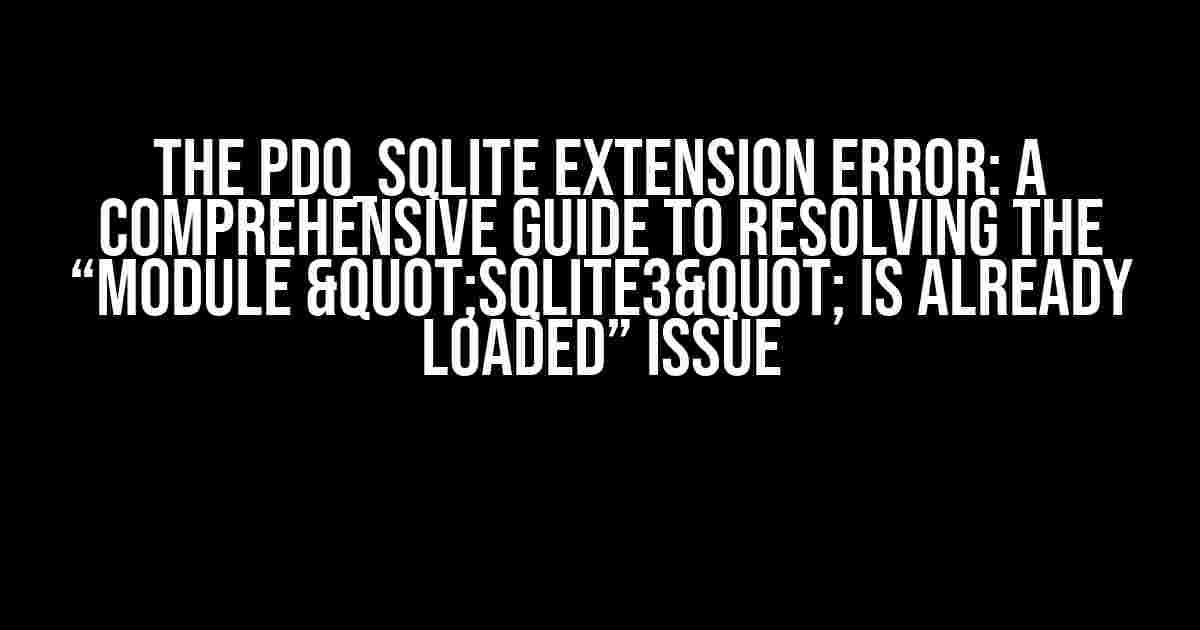Introduction
Are you tired of encountering the frustrating “Module "sqlite3" is already loaded” error when trying to use the pdo_sqlite extension in your PHP application? You’re not alone! This error can be a real showstopper, but fear not, dear developer, for we’re about to embark on a journey to diagnose and resolve this pesky issue once and for all.
What is the pdo_sqlite Extension?
Before we dive into the error, let’s take a step back and understand what the pdo_sqlite extension is all about. The pdo_sqlite extension is a PHP driver that enables your application to connect to SQLite databases using the PDO (PHP Data Objects) interface. SQLite is a lightweight, self-contained, and serverless relational database management system that’s perfect for smaller applications or embedded systems.
The “Module "sqlite3" is already loaded” Error Explained
Now, let’s get to the meat of the matter. The “Module "sqlite3" is already loaded” error typically occurs when you attempt to load the pdo_sqlite extension in your PHP script, but the sqlite3 module is already loaded by another extension or PHP configuration. This conflict causes PHP to throw its hands up in the air and refuse to load the pdo_sqlite extension, resulting in the error.
Causes of the Error
So, what could be causing this error? Well, there are a few common culprits:
1. Duplicate Extension Loading
One of the most common reasons for this error is that another extension or PHP configuration is already loading the sqlite3 module. This can happen when you have multiple extensions or configurations that rely on the sqlite3 module, such as the sqlite3 extension or another PDO driver.
2. php.ini Configuration Issues
PHP’s configuration file, php.ini, might be causing the issue. If the sqlite3 module is loaded in the php.ini file, it can conflict with the pdo_sqlite extension.
3. Apache/PHP Module Conflicts
Another possible cause is a conflict between Apache modules and PHP extensions. If you have other Apache modules or PHP extensions that rely on the sqlite3 module, it can cause the conflict.
To diagnose the issue, let’s take a closer look at the possible solutions.
Resolving the “Module "sqlite3" is already loaded” Error
Solution 1: Disable Duplicate Extensions or Configurations
Identify which extension or configuration is loading the sqlite3 module and disable it. You can do this by commenting out the relevant lines in your php.ini file or removing the conflicting extension.
;extension=sqlite3.so
Solution 2: Update Your php.ini Configuration
If the issue persists, try updating your php.ini file to specify the pdo_sqlite extension as the preferred SQLite driver.
pdo_sqlite.defaultServiceProvider = sqlite
Solution 3: Reorder Your Extension Loading
Reorder the extension loading in your php.ini file to ensure that the pdo_sqlite extension is loaded before any other extensions that rely on the sqlite3 module.
extension=pdo_sqlite.so extension=mysqli.so extension=sqlite3.so
Solution 4: Compile PHP with SQLite Support
If you’re using a Linux-based system, you can compile PHP with SQLite support to resolve the issue.
./configure --enable-pdo-sqlite --with-sqlite
Solution 5: Upgrade Your PHP Version
If you’re using an older version of PHP, upgrading to a newer version might resolve the issue. PHP 7.4 and later versions have improved support for SQLite and the pdo_sqlite extension.
Troubleshooting Tips and Tricks
Check Your PHP Version
Ensure you’re running a compatible version of PHP. You can check your PHP version using the following code:
<?php phpinfo(); ?>
Verify the pdo_sqlite Extension is Loaded
Use the following code to verify that the pdo_sqlite extension is loaded:
<?php
if (!in_array('pdo_sqlite', get_loaded_extensions())) {
echo 'pdo_sqlite extension is not loaded';
} else {
echo 'pdo_sqlite extension is loaded';
}
?>
Check for Conflicting Extensions
Identify any conflicting extensions or configurations that might be loading the sqlite3 module. You can use the following code to check for loaded extensions:
<?php print_r(get_loaded_extensions()); ?>
Conclusion
The “Module "sqlite3" is already loaded” error can be a frustrating issue, but with the right solutions and troubleshooting techniques, you can resolve it and get back to developing your PHP application. Remember to diagnose the issue systematically, and don’t be afraid to experiment with different solutions until you find the one that works for you.
FAQs
Q: What is the pdo_sqlite extension?
A: The pdo_sqlite extension is a PHP driver that enables your application to connect to SQLite databases using the PDO interface.
Q: What causes the “Module "sqlite3" is already loaded” error?
A: The error occurs when another extension or PHP configuration is already loading the sqlite3 module, causing a conflict with the pdo_sqlite extension.
Q: How do I resolve the “Module "sqlite3" is already loaded” error?
A: You can resolve the error by disabling duplicate extensions, updating your php.ini configuration, reordering extension loading, compiling PHP with SQLite support, or upgrading your PHP version.
Resources
For further reading and troubleshooting, check out these resources:
- PHP Manual: PDO_SQLITE
- SQLite Official Website
- Stack Overflow: “Module sqlite3 is already loaded” Error
Final Thoughts
In conclusion, resolving the “Module "sqlite3" is already loaded” error requires patience, persistence, and a willingness to troubleshoot. By following the solutions and troubleshooting tips outlined in this article, you’ll be well on your way to resolving the issue and getting back to developing your PHP application.
Remember, dear developer, you’re not alone in this struggle. The PHP community is vast and supportive, and with the right resources and guidance, you can overcome any obstacle that comes your way.
Happy coding!
Here are 5 Questions and Answers about “pdo_sqlite extension error Module “sqlite3″ is already loaded” in a creative voice and tone:
Frequently Asked Question
Hey there, PHP enthusiasts! Are you stuck with the pesky “pdo_sqlite extension error Module “sqlite3″ is already loaded” error? Worry not, friend! We’ve got the answers to your burning questions!
What is the pdo_sqlite extension error Module “sqlite3” is already loaded, and why does it occur?
This error occurs when you’re trying to load the pdo_sqlite extension in your PHP script, but the sqlite3 module is already loaded by another extension, causing a conflict. It’s like trying to invite two guests with the same name to a party – it’s gonna get messy!
How can I fix the pdo_sqlite extension error Module “sqlite3” is already loaded?
Easy peasy! You can fix this error by simply commenting out or removing the sqlite3 module from your php.ini file. Yes, it’s that simple! Just find the line that says “extension=sqlite3.so” (or similar), add a semicolon at the beginning, and voilà! The error should be gone.
What if I need to use both pdo_sqlite and sqlite3 extensions in my PHP script?
Ah, gotcha! In that case, you can’t use both extensions simultaneously. But fear not, friend! You can use the pdo_sqlite extension for database interactions and use a different SQLite library (like SQLite3 Library for PHP) for other SQLite-related tasks. Problem solved!
Will this error affect my PHP application’s performance?
Not necessarily! This error is more of a configuration issue than a performance bottleneck. Once you fix the error, your PHP application should run smoothly, without any significant performance impact. Whew!
Where can I find more resources to learn about pdo_sqlite and sqlite3 extensions?
Curious minds want to know! You can find plenty of resources online, including the official PHP documentation, Stack Overflow, and PHP communities. For pdo_sqlite, check out the PHP manual, and for sqlite3, visit the SQLite website. Happy learning!
I hope this helps, and happy coding!




![Mysqli Errors on PHP 8.2 Despite it Being Loaded [Closed]: A Comprehensive Guide to Troubleshooting Mysqli Errors on PHP 8.2 Despite it Being Loaded [Closed]: A Comprehensive Guide to Troubleshooting](https://rubio.hkhazo.biz.id/wp-content/uploads/sites/91/2024/07/mysqli-errors-on-php-8-2-despite-it-being-loaded-closed-a-comprehensive-guide-to-troubleshooting-with-text-300x300.jpg)